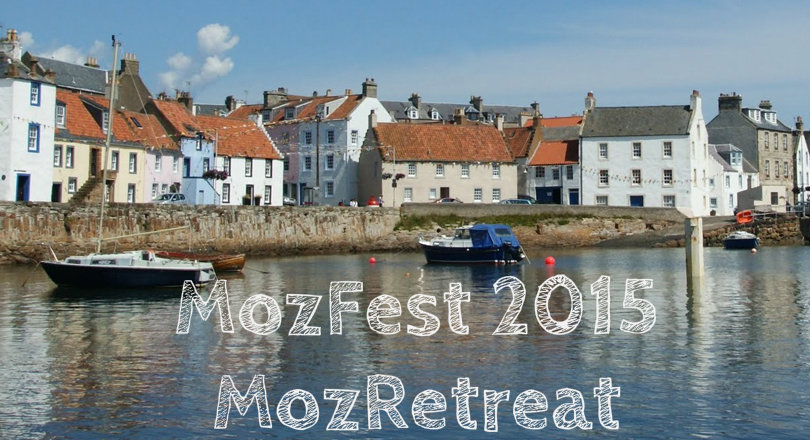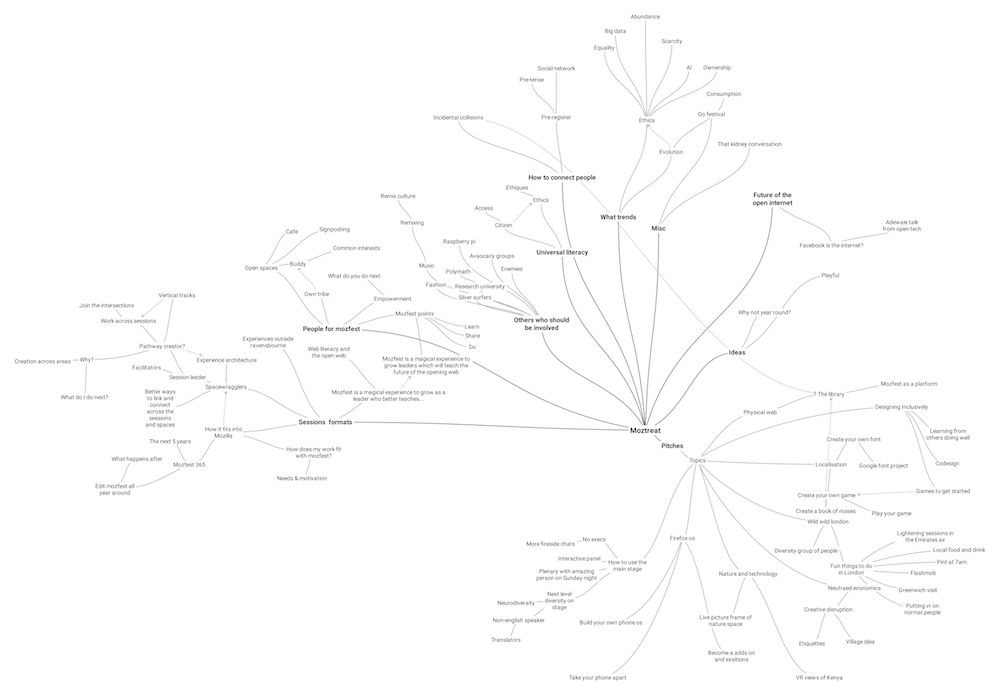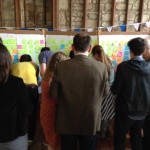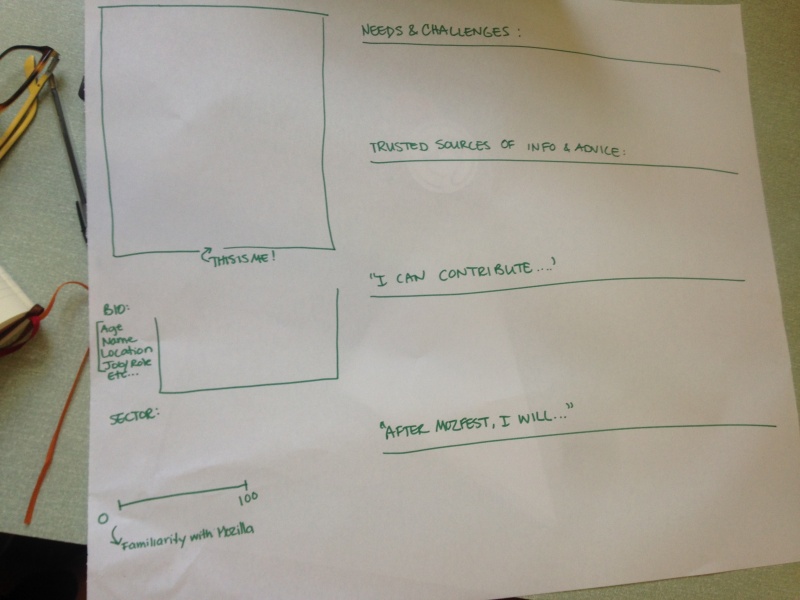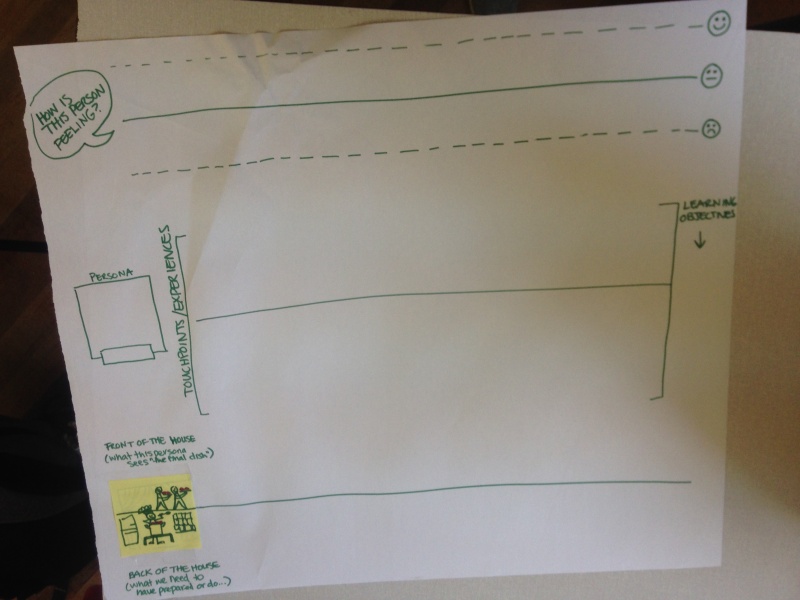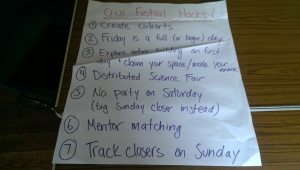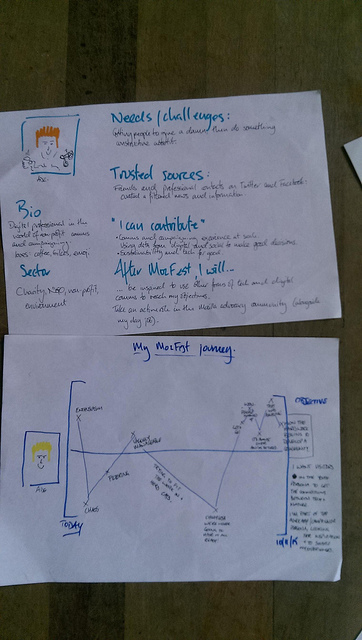Mozfest/2015/Mozretreat
MozFest 2015 Scottish Retreat took place 30th June - 2nd July in Anstruther Fife, Scotland.
Mozilla Festival is about improving the web, keeping it an open resource and accessible to all. This year the festival is 6 years old and we wanted to re-imagine some of the festivals framework, connect with partners and friends to help build the narrative, create intensional pathways for learners, and design MozFest in a participant-centric way.
We brought some teams from Mozilla Foundation, partners and community members from around the world to a small harbour village in Fife, Scotland to help us forge a new future for the festival.
Joining us in Anstruther: Jon Rogers from The University of Dundee was our host and he brought many estimeed colleagues with him, Nick Taylor, Ali Napier, Sarah Cook and Rob. Ian Forrester and Jasmine Cox joined from BBC R&D, Mike Saunby from the Met Office, Ade Cockle from WWF and Ali Davies from Zoological Society London. Praveen Nahar travelled from India with Babitha George. Praveen works for The National Institute of Design and Babitha runs a festival called UnBox. Martin Skelly from Uniform travelled north to join us and those who didnt have to travel very far were Alex Astruther, Jude Thomas, Felix and Otis Rogers, Sabina, and Kate Laundon.
From across the Altantic Mozilla colleagues who work across many Mozilla inititives and projects travelled and braved the jet lag to join us for the three days. Kaitlin Thaney from Science Lab, Erika Owens from Open News, Melissa Romaine from Advocacy team, Bobby Ricther of Webmaker fame, Simona Radisson and Amira Dhalla representing the Mozilla Learning Networks team. While Erika Durska came with two team hats on for Engagement and Fundraising. Mozilla was further represented by Dees Chinniah, head of Global Mobile partnerships, and The Participation team headed by George Roter with Emma Irvin. We had contributors join us from near and far, Dorina Flies and Harry Zammit-Smith, Simeon Oriko from JamLab and Dian Ina Mahendra.
Mark Surman, Executive Director of Mozilla foundation already 3 weeks into a 5 week round the world trip joined the team with his son Ethan. Ethan contributed immensely as part of a small but mighty group of youths at the event. Helen Turvey from Shuttleworth Foundation, super couple Heather and Dwayne Bailey, Claire Selby representing Ravensbourne College, the festivals home for the last 4 years, and Christine Prefontaine of The World Bank rounded off the inspiring group working us to evolve this years festival. Us- that is Michelle Thorne, Misty Avila and Sarah Allen representing the Mozilla Festival Team.
This page is still mid-build so apologies for any spelling mistakes.
Day One
After the opening circle and group introductions we jumped straight into the first session.
Big Idea Rotation
We opened the morning sessions with the big idea rotation led by 7 facilitators on the following topics. Outlined under these topics is a brief list of the outcomes.
What do we mean by Universal Web Literacy?
with Michelle Thorne
MozFest is a magical experience for you to grow as a leader who can better teach others to read, write and participate on the web.
Ideas on how to make MozFest fun
Led by Amira Dhalla
Top ideas generated:
- Intro to Mozfest. Run a session or time dedicated to helping on-board those attending for the first time.
- Integrate an arts component. Do some sort of local visual arts display. There is also a lot of interest in general for more arts integrations both from the inside and outside
- Buddy or pairing system.
- Maker prom on the Saturday night (instead of a Saturday night event or Maker Party during the day). There would be a middle dance floor where people dress up or get prom styled and all around the dance floor are maker stations to do/make fun things. This could also exist as the closing on the Sunday late afternoon.
Allies and friends should we be inviting to the festival?
Led by Simeon Oriko
Education and research communities
- Universities
- Historians, archivists and museums
- Antropologists and sociologists
- Local Schools
Communities under represented in tech
- LGBTQ communities
- Social activists
- Allied media conference
- Older generations
- People of minorities
Weird Industries
- Sound loud,
- Youtube stars
Legal
- CC
- FSF
- EFF
Those who don’t aligne with our Mission to challenge us
Organisations that use the Web for Advocacy
- Obama's Digital team
- Code of America
- Change
- Open street
How can MozFest be a catalyst for your work?
Led by Heather Bailey
- Mozfest can provide opportunity and show case your work. Our audience is driving and building skills and curating art.
- Facilitation sessions and providing follow through
- Big picture organisations – how the evolve and tracking the process
- Allow People to meet before hand on an online forum, with a curation level
- Start the conversations earlier, measuring connections.
- Natural connectors- how to help others who are not networkers by creating the connections ourselves which are meaningful
- Stickers for interesting topics
- Project sprints- lead more effort into setting up the ground work eg lab school
- Learning and teaching by train the trainers and showcasing
- Seek out collaborations
- Play a game- match and learn/
What hot topics and trends are on your mind ?
Led by christine Prefointaine
- The Web
- Inequality & raising gap disparity - Inclusion, rights of labour and as humans
- Quantified self and quantified community
- Wearable technology and embedded tech
- Radicalism
- Aging population
- Web connections - connecting self and not between ourselves -promoting self acutalisation over community
- Accreditation and education - Technology affecting our brain and evolution
- Privacy
- Craft
- Youth - Disenfranchised, commoditized, boxed in, Yolo v's don't come
- Advertising - Filter bubble, economy of the web
- Legacy - Cultural amnesia over what is new, librarians and archivists & Internet effecting social norms
- Digital usage - Access, child protection, whistle blower, copywrites.
- Ownership and austarity
- Art - Reduction of narratives, function to help us understand our time
- Decentralisation of food and power - Consumption and Convergence
What is the Mozilla Learning strategy?
Led by Mark Surman
Building on Webmaker, Hive and our fellowship programs, Mozilla Learning is a portfolio of products and programs that help these citizens of the web learn the most important skills of our age: the ability to read, write and participate in the digital world. These programs also help people become mentors and leaders: people committed to teaching others and to shaping the future of the web. Read more about the strategy {https://wiki.mozilla.org/Learning/Strategy here]
Project Fair
The project fair was another opportunity for the group to introduce their work to each other. The group was broken out into project leads and the audience, with the audience having the opportunity to roam the floor, hear about the various projects and ask questions.
Srconn
200 participants with 70 facilitators Community and Participation with Intension Pathway : MozFest ----Srconn------Nicar Intensional follow through year arc of events Post event field trips
Universal Web Literacy
Mozilla, together with partners and collaborators, are striving for universal web literacy with an approach called connected learning. Connected learning is based on research that people learn best if they can combine their personal passions with rigorous academic scaffolding and to make projects with friends, peers and educators. Open networks make this learning possible. We unified our efforts in education in the Mozilla Learning Network. We serve our mission by teaching digital skills in local communities through interest-driven learning and making. Our goal is to help people become critical consumers, contributors and participants on the Web. If people experience the web as critical to their learning, work and social lives they will better understand their role in helping the Web remain open, accessible and a resource for all.
Mozilla Learning Networks will achieve this through :
Creating Networks- Hives - Supporting city-based communities where educators, organizations and learners are networked for greater impact. Fueling innovation in the larger mentor ecosystem.
Convenings - MozFest- intensional events spread throughout our community and calendar giving the opportunity for in-person gatherings and focus to create, build and cultivate resources and strategy.
Groups- Clubs- help us cultivate deeper, local relationships and leadership. Clubs builds on our efforts to mobilize the community by offering more ongoing and sustainable experiences to teach web literacy skills in local contexts. Read more at www.clawrence.org
MEA
East Africa Problems and solutions Taking place 17th - 19th of July in Kampala, Uganda, Africa.
Topics
- Social innovation
- Education
- Web& mobile tools and technologies
- Digital culture and maker movement
- Policy and advocacy
- Open date and development
- Community
Mozilla's Privacy Moment
Led by Erika Durska Mozilla’s Privacy ‘Moment’
Background: Mozilla is combining product, community and engagement to mobilize around the issue of privacy. We’ve already accomplished a lot in this area with teaching resources, the Lightbeam add-on, and education and advocacy campaigns. Over the next few months, we’ll create additional products and resources, culminating in November with what we’re calling a privacy ‘moment’.
MozRetreat discussions: What does privacy mean? It immediately became clear that privacy does not mean the same thing across cultures. In North American English, we use it is as an umbrella term to encompass a number of ideas ranging from personal security to big data. In other English-speaking countries, it is not an effective catch-all term, and instead feels limiting, or like a “very narrow piece of the pie”.
Here is what privacy means to some of the MozRetreat participants:
- staying safe online
- policy
- parental controls (in browser, and using hardware)
- feeling free to explore the web without being watched
- not collecting personal data
- cookies and trackers
- private browsing
- the creation of data profiles
- controlling how your data is linked between different profilers (third parties that collect and share data about you)
- what we hide
- data ethics
- personal security
- ownership of our data
Suggested products to feature or engage at MozFest:
- Telegram (like an encrypted version of WhatsApp)
- Firefox: Train the browser to learn what you don’t like (e.g. you don’t mind targeted ads, but don’t like pop-ups that show after you’ve already made a purchase)
People to invite or engage at MozFest:
- commission artists ahead of the festival through mini-residencies to explore privacy - show final projects at MozFest
- Heath Bunting: London-based artist
- Branger-Briz: London-based artist who has a ‘privacy charging station’ that lets you charge your device for the price of a personal photo
- artists making art using wikileaks files
- BBC’s the ‘Ethics of Data’ team
- There’s an upcoming Privacy Awareness Campaign in Indonesia that will have hashtags and Privacy days. We can invite community members who participated/ran events.
Privacy-related activities to explore at MozFest:
- parenting children in the era of big data
- security on personal devices that don’t have screens (IOT) like plushies, Oystercards, wearables etc.
- Internet archiving: valuable cultural heritage or “your stupid mistakes online forever”?
- Exploring your filter bubble: what do advertisters think you want?
- Going “silent” on the web to maintain privacy - is this even possible?
- Economic models that either charge for privacy, or use privacy as a currency (e.g. the charging station that ‘costs’ one personal photo)
Mobilizing Community to protect the OpenWeb
Led by Melissa Romaine
What is the Advocay team doing?
- Leading online dicussions
- Request for policy support
- Advocacy task forces
- Leadershop
What are our goals?
- To Educate, Empower and Enact Policy Change
Recent Stories
- NN in India
- Surveillance in France
- Data in Nicaragua
- Surveillance in US
Target Audience
- Policy Makers
- Lobbyists
- Lawyers
- Techonogists
- Community
- Educationors
Webmaker and Learning Products
With Bobby Richter
Create, Share and Remix
Read, Write and Participate
Community, content and stories
How can MozFest be a platform for Mozilla Learning?
Goals:
- Universal Web Literacy
- Cultivating facilitative leadership
- Teaching it Forward
Day Two
Personas
Large group persona brain storming where we broke the larger group out into smaller groups to list out stake holders as per sector or area. We asked the groups to be very specific when listing out stakeholders- a female teacher was too board, the small details were very important. We then built a colourful wall of post-its personas, from which we curated the top ten personas to work on during the next session through a voting system.
Pathway Breakout
We created a series of pathways through the festival weekend for these personas, asking the groups to think why their persona comes to MozFest, what are they hoping to learn and contribute. We wanted groups to think about how this relationship with Mozilla developed, what was their journey like to this point and what do they want to learn and bring back to their own communities.
Experience touch points
We examined the touch points of these created personas where they intersected with the festival. We mapped the intersectional points as Back of House versus Front of house for these experiences, while thinking their personas learning objective
You can read the results of all three session on this google doc which hopefully will give you a strong understanding of who the personas are, their learning objective and the experiences we hope to build.
Day Three
The Weird, the Wild, the Worthy and the Wow
** This section is still missing notes **
In small groups of 3 and 4, reflecting on our pre event interviews results, we examined what sessions could be created at this years festival and how it could be experienced by the personas we created the day before. Thinking of narrative and pathways we asked the groups to think of the sessions as stories- with a beginning, a middle and an end.
List of Topics
Lingustic Inclusion
- led by Dwanye and Heather Bailey Through local elements, interactive boards and senses the audience at MozFest will be encouraged to meet and contribute with the localisation team. Orientation through confernce ice breakers, volunteer led guidence and lightening talks will create low barrier connection points. Senses will be focused on through music, and play with a D.I.Y room. There will be many interactive boards such as a commmunity board, pin and photo boards for people to test and contribute to. The local elements will be evoked though interactive tours of London and showcasing London art and its people. Games and Art will also play a significate draw for participants to start their journey of interacting with new cultures and languages, with a talent show, installations and art people can create as a group.
Nurtured Economies
led by Jon Rogers The Application to MozFest- through Scale, Disruption and Farm vs Allotment. Mozfest is like a village, it needs spaces to slow down and connect. We must build our home through ownership and create scafolding to chaos but maintain deep connections and build emerging leaders.
Nature and Environment
led by Ade and Alister
Having framed tablets mounted to the wall in hallways to show live feeds from different greenways locally a tech nature trail will be created. This trail would lead to a nature corner within the building where sessions would take place. Three questions would frame this topic : How can we bring nature into Ravensbourne College? What impact is technology having on the environment? How can we show technology is helping the environment? Session ideas: Can tech save the ocean?
- How can we hack a better planet
- We are the makers, IOT & Minecraft
- Nature is here. Make a Cam- projection map
- Hack a better future
Weird London
led by Dees and Claire The idea behind this session is to expand the festival beyond the 4 walls of Ravensbourne and to bring the participants on a journey of discovery around the city. Dees and Claire talked about London through the lens of locals, highlighting the weird and unusual parts of the city. They suggested different activities for all tastes.
- Smithfield markets which open at 5am and where you can get a pint at 7am
- Different modes of travel such as the Thames Clipper and the Emirates line to Excel centre for future cities exbo
- Bring the Moz Lab out onto the concourse around the building - taking passerbys on unsuspecting journeys with VR glasses and innovative installations
- Bringing in the london charm with Pearly Kings, Morris dancers and cricket games.
- Tasting the flavour of the city with Brcik lane curries and salt beef bagels
- Bringing people to the old and famous pubs of the area, MayFlower, Jon Snow and Ten Bells.
FFos at MozFest
- led by George Router At MozFest in 2014 we had the Flame phone, with basic web experiences that change the users lives. A new stragey is emerging, Adaptability and Customisable . MozFest 2015 has huge potential through Hacking FXOS ,JOT , Add-ons and building browser based games. What are we excited about? Leveraging for attention of the kids through Webmaker. Firefoz OS for the Maker Community, no restrictiosn on the Market place, sturdy and reliable.
Buddy/Life Guard/ Guidance Assistance
led by Bobby Richter These guides would facilitate, prepare and provide vision and mentorship. Through Troubleshooting, providing information, support and continued involvement with the person across the weekend. This assistance will help the participant feel less isolated, encourgae connections, cuarte a meaningful experience and push people to move beyond pariticpation to encourgae leaderhsip and teaching. Pre-event we will
- Do outreach and create documentation for the buddies
- Ensure introductions are made pre festival
Ho to use plenary and main stage
led by Erika Druska
Designing Inclusivity
led by Simona Radisson
How to start the conversation of inclusion and diversity at the festival:
- Identifying organisations that could support the shapping of this session and building relationships
- Conversations through outreach (and increase these voices at MozFest), during the event and content
- Variety in session leaders
- Setting expectations and accountability by being deliberate and tracking from registration point onwards
The story of designing inclusivity begins at registration point, asking people to self identify. The Middle is mapped through Localization workshops with play and co design. The ending results in best practises and actional practices.
Internet of Things
Led by Jasmine Cox Portal that connects your to the community through the universal symbol of the library. Building an Affinity Space to encourage the sharing of knowledge in secific areas and encourage informal learning while creating a tangible experience. Books are suggested by session holders with secret notes within the books. We also want to generate books over the weekend so we will have a blank folder with what is happening over the weekend.
Digital Ethics
led by Ian Forrester
Mapping Our Own Experiences
Our last session was about mapping our own journey through MozFest 2015. Asking them to map out their touch point experiences from today to the 9th of November. From there they articulated the contributions they made to particapnts experiences and documented what support they would need and what they needed from the MozFest tam. This was based off defined personal objectives or goal for their Mozfest Journey.
As a last touch point we asked the participants to outline their We Will / We Should objectives for the Festival.
We will..
Spend time and think and share what mozfest means for those who can't make it. (Simeon)
Reach out to my work colleagues in Policy and Advocacy and start getting buy-in and engagement to build the BEST advocacy experience EVAARRR! (on Wednesday). (Melissa)
Heather will make a list of very interesting inspiring localization people that must be at Mozfest.
Debrief my team on the conversation. Erika O.
Reach out to others leading fellows program, see what we can do before Mozfest. (KT)
Follow up the library idea with Claire at Ravensbourne. (Ian)
Connect with Mark re: WBG strategy (Christine)
Connect with Sarah, Michelle, and Misty re: event design support (Christine)
Flesh out the library idea and tell people about it. (Jasmine)
Coordinate with my collaborators (Tim Brooke)
Investigate how we can localize Mozfest Meet with George (Helen)
I will do my best to expand peoples bubbles!! (Dorine)
Make amazing things happen to make the festival better.
Connect and talk with Emma and Goerge again next week and start working closely with them. (INA)
Create a session around VR and the natural world
Co-design pathways for leadership training (Emma)
Follow up with Erika Owens to keep our conversations going on inclusion (Simona)
Go to Mozfest (Alix)
Actually follow up with some contacts (Nick)
Prepare, Coach and Buddy a business person (CIO?) coming to Mozfest (Micahel Saunby)
Continue to make games on unity for others to play.
Try to make the youth track the best it's ever been and spread the importance of Web literacy (Ethan)
We should...
Have a monthly call
Think about pre-events/meetings especially the London piece - even if just for a few hours or more social
Create buddy groups for attendees to join before mozfest
Identify dependencies or similar goals between us and stay connected
Get together in local teet ups before Mozfest IE. London Area (heather)
Involve community in the selection process; make it more transparent and open
Ensure Mozfest is a safe space to discuss crazy ideas
Update the wiki and get all the data and info from this moztreat available for everyone right away
Do more coding (otis)
Eat cake maybe
Solidify what Mozfest is and collectively make community aware of it
Go to the science museum as a team and have a day of Joy. Then reflect on the navigation pathways.
Making sure kids age can "roam" Mozfest I.E. Volunteer are DBSID
Debrief as a group of what we learned at the retreat
Support facilitators in developing more innovative sessions
Identify pathways we want to make sure we present --->> Define how cross track or cross paths unaffiliated work tracks will work (Erika O.)
Rally around the shared space - greeter idea and work it into the tracks (Ian)
Come back to Anstruther next year to plan Mozfest!!!
Follow through on the kidney plan #kidneygenocide
Reflect on this week with our networks and soundcheck our ideas.
Identify themes that cross-tracks and explore how to efficiently plan to showcare that at the event. KT
We should have more cakes
Hack the submission form to make sure wranglers are getting adequate info
Stay friends and be awesome
Fully integrate youth into the main streams and events
Do this every year here in Anstruther
Related Blog posts
Read some of the blog posts from those who joined us over the retreat as they explain their experiences and work streams.
Michelle Thorne MozFest Retreat and Participants pathways
Being in Anstruther
- Welcome tea with elders of Anstruther. Our event was held in the town’s hall. Every Tuesday, the senior community hosts a tea in the hall. Rather than displace them with our event, we were kindly invited to join them. So the retreat started by having homebaked cakes with people who’ve lived in the village for decades. That grounded us and gave a humbling perspective on technology in these communities.
- Youth participants. On the other end of the age spectrum, we were also honored to have 5 young people (aged 8 - 16) join us as participants in the event. They brought incredible perspectives and ideas to the mix. And they appreciated that they weren’t treated as kids, but as peers in the conversation.
- Reception at Balcaskie with Chief of the Name and Arms of Anstruther. An important part of the history of Scotland is its clans. We were warmly welcomed by Toby Anstruther and his family in his estate. His family plays a very active role in the village, setting up and supporting many initiatives that contribute to everyday life there.
- Concert by King Creosote. The town hall converted into a music venue in the evening, where Kenny, a local musician of much renown, sang a lively set for us and others from the village.
- Fish and chips. No visit is complete without homage to the local cuisine. Fish and chips, whiskey, local ales, fresh vegetables from the nearby garden. We did enjoy experiencing the food!
- Teaching the web at Fisheries Museum. We also wanted a chance to meet more educators and young people in the village and explore how we could continue to learn and teach the web in Anstruther. At a playful show & tell, we shared the Mozilla Clubs initiative, heard from local video game developer known for his work on Grand Theft Auto, and saw demos from the young people building things in Mindcraft and beyond.
